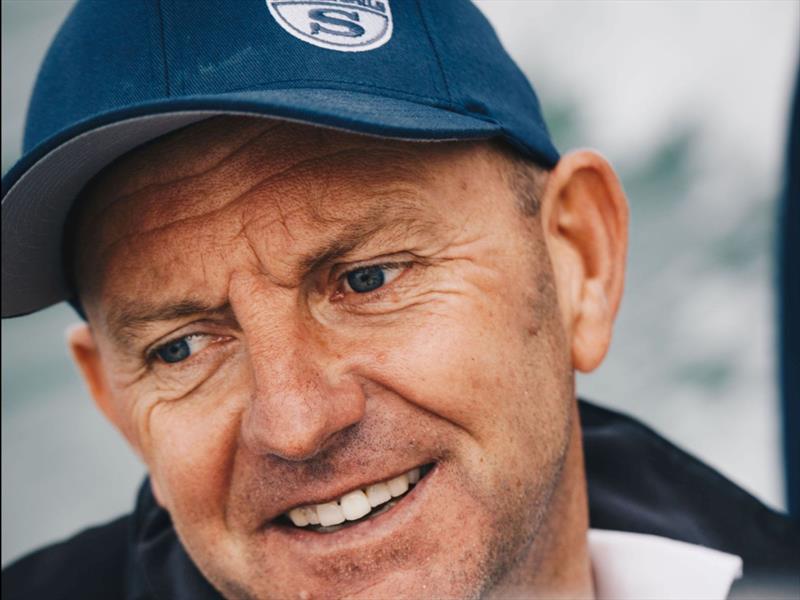
Ian Walker: Gripped by the Vendée Globe and waiting for Cape Horn to play its part
by Ed Gorman / IMOCA Globe Series 19 Dec 2024 14:44 GMT

Ian Walker © North Sails
Like hundreds of thousands of others around the world, Ian Walker, a double Olympic silver medallist and winning skipper of the 2014-15 Volvo Ocean Race, has been gripped by the drama of the Vendée Globe.
"I think the starting point is having 40 cool, awesome boats on the startline and every boat is a story in this race," said Walker, who is now the General Manager of North Sails UK and whose company has sails on board just over half the competitors in this record-breaking fleet.
"It is so accessible now for us to follow the racing and to follow the tracker," he continued. "For me personally, I love the sort of tactical and navigational battles we have seen. Professionally, at North Sails, we've obviously got a lot of interest in the performance of the boats but, as a British sailor, we've also got a strong British representation in the fleet...so it's got a bit of everything for us."
The former Performance Director for the British Olympic sailing team in the build-up to the Tokyo Games says a key moment came when the leaders made their strategic choices ahead of the big depression that dominated the Southern Indian Ocean. It was at this point that Charlie Dalin (Macif Santé Prévoyance) and Sébastien Simon (Groupe Dubreuil) elected to sail through the heart of it while the chasing pack diverted to the north.
"The race really came alive when everybody in the office was gathering round the computer looking at that storm in the Indian Ocean and seeing the decisions of theskippers - whether to go north or whether to take it on, as Sébastien and Charlie did," said Walker. "And then the outcome of those decisions. It was like four days of shall they? Shan't they? Will they outrun it and stay ahead of the front - so that was captivating. And now we've seen the charge from Yoann Richomme (Paprec Arkéa) - it's staggering when you think that he's closed all that distance."
Although there are three clear leaders currently sailing neck-and-neck in the Southern Pacific Ocean towards Point Nemo, Walker does not believe the chasing pack are out of this race. "I think anybody who is within 1,000 miles of the lead - two days sailing, say - maybe even more...is a genuine contender, especially if their boat is more optimised for the Atlantic than the Southern Ocean," he said.
The former skipper of Abu Dhabi Ocean Racing believes Cape Horn could still play a big role in the outcome of what has already been a classic race. "Don't underestimate the luck of the cards you get drawn at Cape Horn, in terms of the intensity of the weather on your approach," he said. "But also we've seen in previous round-the-world races that you can be 1,000 miles ahead at Cape Horn, but if there's no wind, or you have to sail wide or go outside the Falklands, and somebody comes along just as some breeze is coming off the South American coastline, they can literally cut the corner. A thousand miles can disappear or come to you very, very quickly and it's just the luck of the draw in terms of timing as you go round the Horn."
With his own experience of the Southern Ocean, Walker watches the boats on the tracker with probably a better idea of what the sailors are going through than most. "I think what's very difficult for us to understand in the warm, looking at a computer screen, is just the intensity and how long they've been sailing at this pace, with all the noise and the motion," he said.
"I think it must be very, very stressful. It is very stressful down there and in the next week they will be starting to look ahead to Cape Horn and wondering about what cards they will be dealt there, which is one place where you haven't got the choice to go north to avoid the weather," he added.
Walker also makes the point that the weather we see on the tracker or on dedicated sailing weather sites is only a broad brush depiction of what is happening in real time. And the wind in the Southern Ocean is rarely steady in direction or speed. "It's the other thing you don't see on the computer screen, but it's the reality and you hear the skippers talking about it - just how gusty and shifty the wind can be," he said. "You are not just looking at a Grib file and you've got 20 knots or 30 knots, it's when it's 40 knots one minute and the 20 knots the next, particularly behind a front when it comes from the south."
Walker is loving the battle at the front but he has also been keeping an eye on the daggerboard fleet where 65-year-old Jean Le Cam (Tout Commence en Finistère-Armor Lux), the oldest competitor in the field who is on his sixth Vendée Globe, has been leading for most of the race. He is currently the top daggerboard boat in 18th position, just over 3,000 miles behind the leader.
Walker says the gap in performance between daggerboards and foilers has widened since the last race. "Looking at the last race, the non-foiling boats were arguably quicker in the Southern Ocean, but today, the situation has changed. The development of foilers has accelerated significantly over the past four years, and they are now well ahead," he added.
Find out more...